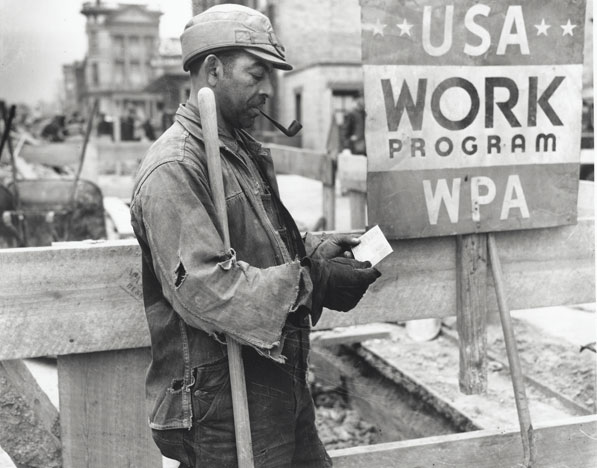Consider some new ways to put Rhode Islanders back to
work
By RI General Treasurer Seth Magaziner
 |
| During the Great Depression, President Roosevelt used the Civilian Conservation Corps and Works Progress Administration to put millions of unemployed back to work. National Archives photo. |
Thanks to the bravery of our front-line workers, the guidance
of our experts and officials, and the resilience of our citizens, Rhode
Island’s response to the virus has been better than most. But great challenges
remain.
We must now focus on rebuilding our economy to be more
robust, sustainable, and equitable than before.
Our priority must be to create jobs for the more than one
hundred thousand Rhode Islanders who are out of work.
We can put Rhode
Islanders back to work right away through a “Covid Corps” that will employ
people to assist in the effort to contain the spread of the virus in the months
ahead.
Rhode Island will need more people to work as contact tracers and community health workers, to assist teachers in delivering remote instruction, and to deliver meals to seniors in quarantine, among other vital needs.
We can also put more Rhode Islanders to work making needed repairs to our public infrastructure. There is no shortage of shovel-ready projects that can put people to work today while making our economy more resilient in the long run.
 |
| To most Rhode Islanders, one of the most familiar legacies of the WPA is the Roger Williams monument in Providence's Prospect Terrace. |
Rhode Island will need more people to work as contact tracers and community health workers, to assist teachers in delivering remote instruction, and to deliver meals to seniors in quarantine, among other vital needs.
We can also put more Rhode Islanders to work making needed repairs to our public infrastructure. There is no shortage of shovel-ready projects that can put people to work today while making our economy more resilient in the long run.
Small businesses, the most important engine for economic
growth and opportunity in our state, have been hit especially hard by the current
crisis. The state should provide financial assistance to help small businesses adapt
to social distancing, making it easier for them to reopen and rehire their
employees.
The Covid-19 crisis has also cast a light on inequities that must be corrected to prevent future epidemics. We need to build more affordable housing in Rhode Island. The virus has disproportionately impacted communities of color and senior citizens in part due to high levels of congregate living that result from lack of affordable housing. We should also invest more in building out Health Equity Zones, an innovative concept to improve health in vulnerable communities, championed by Department of Health director, Dr. Nicole Alexander-Scott.
All of these priorities require funding, and the recession has reduced tax revenue and other traditional sources of state income. Rhode Island’s congressional delegation has been working diligently to deliver federal aid to our state, but it is unlikely that we will be able to rely solely on Washington to fund our recovery. Our needs are too immediate and too great.
In times of crisis, Rhode Island has often turned to bonding as a useful tool to stimulate the economy and put people back to work. We can employ this tool again in order to catalyze a lasting economic recovery for Rhode Islanders.
As Rhode Island’s Treasurer, I know we must not borrow beyond our means. For this reason, as Chair of the state’s Public Finance Management Board, I pushed to establish new guidelines limiting state borrowing three years ago. Under those guidelines we currently have significant capacity to issue bonds to help fund an economic recovery in our state.
Prior to the Covid-19 pandemic, Governor Raimondo proposed approximately $387 million of bonding in her recommended budget. This amount can be increased to $600 million and remain affordable under Public Finance Management Board guidelines while also leaving capacity for additional bonding in future years. The proceeds of any bonding should be directed to initiatives that will put Rhode Islanders back to work, rebuild our economy, and address the systemic inequities in our state.
This is not a time for half measures. The challenges we face
are big and require a bold response. Everyday Rhode Islanders are stepping up
heroically in the face of crisis, and they deserve to have their state
government act decisively to build a lasting recovery.
Seth Magaziner, a democrat, is the Rhode Island state
treasurer.